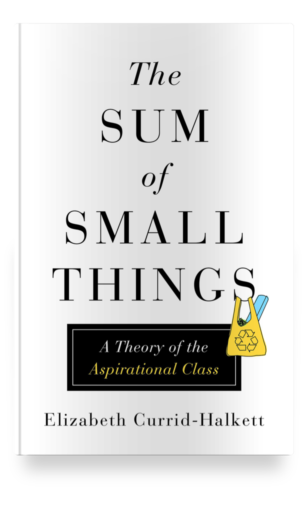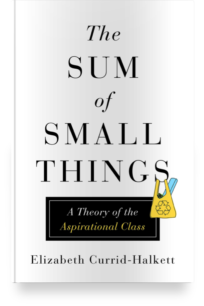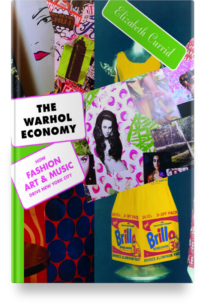The Sum of Small Things
NAMED A BOOK OF THE YEAR BY THE ECONOMIST
In today’s world, the leisure class has been replaced by a new elite. Highly educated and defined by cultural capital rather than income bracket, these individuals earnestly buy organic, carry NPR tote bags, and breast-feed their babies. They care about discreet, inconspicuous consumption—like eating free-range chicken and heirloom tomatoes, wearing organic cotton shirts and TOMS shoes, and listening to the Serial podcast. They use their purchasing power to hire nannies and housekeepers, to cultivate their children’s growth, and to practice yoga and Pilates.
In The Sum of Small Things, Elizabeth Currid-Halkett dubs this segment of society “the aspirational class” and discusses how, through deft decisions about education, health, parenting, and retirement, the aspirational class reproduces wealth and upward mobility, deepening the ever-wider class divide.
Exploring the rise of the aspirational class, Currid-Halkett considers how much has changed since the 1899 publication of Thorstein Veblen’s Theory of the Leisure Class and the coining of his famous term “conspicuous consumption”. Now, Currid-Halkett argues, the power of material goods as symbols of social position has diminished due to their accessibility. As a result, the aspirational class has altered its consumer habits away from overt materialism to more subtle expenditures that reveal status and knowledge. And these transformations influence how we all make choices.
With a rich narrative and extensive interviews and research, The Sum of Small Things illustrates how cultural capital leads to lifestyle shifts and what this forecasts, not just for the aspirational class but for everyone.
Praise for The Sum of Small Things
“This is the cultural elite — or what Elizabeth Currid-Halkett..calls the “aspirational class”. Her book The Sum of Small Things anatomises it using fascinating American consumption data….Her intellectual ancestor Thorstein Veblen, in his 1899 study The Theory of the Leisure Class, portrayed Wasps frittering away money, but today’s cultural elite is engaged in a ruthless project to reproduce its social position… No wonder the key rite of cultural-elite conversation has become Trump-dissing… And so the cultural wars that got him elected rage on.”
“Her theory is a breath of fresh air…What makes Currid-Halkett’s argument powerful is that she mines the data to prove that the members of this group are passing on their privilege to their children in just as pernicious a way as the old aristocrats passed on their estates and titles.”
“Exploring how the consumer choices of today’s ‘aspirational class’ express identity and values yet reinforce social exclusivity and economic status, Elizabeth Currid-Halkett’s lively book offers a thoroughly researched and fair-minded update to Veblen’s classic look at the leisure class. Eschewing mockery and polemics, The Sum of Small Things challenges readers to think hard about culture and consumption in a postscarcity economy.”
“In her thorough book, “The Sum of Small Things““, Elizabeth Currid-Halkett argues that the educated class establishes class barriers not through material consumption and wealth display but by establishing practices that can only be accessed by those who possess rarified information.”
“What are the status consumption habits of the twenty-first century? In The Sum of Small Things, Elizabeth Currid-Halkett blends social science and keen observation to present the new, best guide to this topic of never-ending interest, for the status-conscious in all of us.”
“‘Organic’, ‘artisanal’, ‘boutique’–these are the catchwords of what has become, in Elizabeth Currid-Halkett’s view, a new self-regarding social class, grounded less in money than in elite education, and inured to the problems of those less fortunate. This is a timely, original, and disquieting analysis of contemporary American society.”
“There is a lot to learn here about the contemporary face of income inequality.”
“This book takes readers on a tour of contemporary U.S. inequality—in particular the classes who occupy its highest strata—via characteristic patterns of consumption behavior. Revealing polarizing patterns of class behavior, this engaging and thought-provoking work will attract a substantial readership and generate discussion.”
“Elizabeth Currid-Halkett, author of The Sum of Small Things, says a new cultural elite is on the rise: the aspirational class. These are people who aren’t necessarily rich but who share a set of views on the most socially conscious ways to spend money…. That’s why, for this milieu, “a $2 heirloom tomato purchased from a farmers’ market is so symbolically weighty … and a white Range Rover is not.””
“The aspirational class gets a kick in the quinoa courtesy of Elizabeth Currid-Halkett’s The Sum of Small Things“
“The Sum of Small Things crackles with original insights about consumer goods and the individuals who choose them. Currid-Halkett’s concepts of ‘the aspirational class’ and ‘conspicuous production’ advance consumption studies and provide fresh news about the search for distinction. Fast-paced, well-told, and unfailingly interesting, this book is an intellectual treat across the board.”
“Just as Thorstein Veblen captured his time with the phrase ‘conspicuous consumption,’ Elizabeth Currid-Halkett nails the contemporary rise of a subtler but no less materialist inconspicuous consumption. This book is a must-read for anyone who wants to understand modern cities or culture today.”
“A key companion to Robert Putnam’s survey of dwindling US social mobility, Our Kids.”
“The Sum of Small Things: A Theory of the Aspirational Class, by Los Angeles academic Elizabeth Currid-Halkett, looks at the consumer side of proximity and inequality. Kicking off from Thorstein Veblen’s idea of conspicuous consumption, in which the leisure class of the 19th century displayed its inherited wealth through material goods, she posits a new ‘aspirational class.'”
“Currid-Halkett’s biting, often humorous commentary is not just a send up of the so-called “coastal elites.” It’s a trenchant analysis that combines economic and sociological evidence to describe major trends.”
“Part of how they’ve gotten away with it is that they, like Bank of America, are part of a corporate elite rather than cultural elite. And nowadays the cultural elite can have a markedly different ethos than its corporate brethren. So writes Elizabeth Currid-Halkett in her book The Sum of Small Things: A Theory of the Aspirational Class.”
“Rather than filling their garages with flashy cars, today’s rich devote their budgets to less visible but more valuable ends: education, domestic services and cultural capital. A professor at the University of Southern California shows why it is so difficult to stop the privileged position of the elites becoming more entrenched.”






